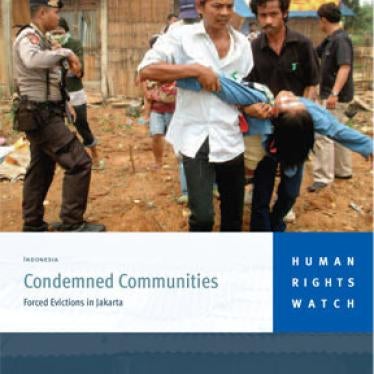(Jakarta) - The Jakarta regional government has been forcibly evicting tens of thousands of the capital’s urban poor from their homes, often leaving them homeless and destitute, Human Rights Watch said in a new report released today.
The 115-page report, “Condemned Communities: Forced Evictions in Jakarta,” describes the government’s excessive use of force to clear out urban slums. It draws on numerous evictees’ accounts of government security forces beating or mistreating them before destroying their homes and possessions. Many residents say they were given so little warning before their homes were razed that they did not have enough time to collect their belongings. Others describe how security forces opened fire on communities and set buildings alight while people were still inside.
The government of Jakarta justifies many of the evictions by claiming it is trying to ensure public order, remove trespassers from private or state land, or clear land for infrastructure projects. However, the government has used excessive force to conduct the evictions and failed to provide alternative housing or other assistance to the displaced.
“It isn’t just that the regional government has failed to protect people – it is in some cases actually attacking them,” said Sophie Richardson, deputy director of the Asia division of Human Rights Watch. “The government should place a moratorium on evictions until it consults with civil society groups and comes up with an improved procedure for evictions.”
The evictions are organized by the local government authorities, and are enforced by the local police, public order officials, and the military. At times, gangs of thugs help the government forces carry out the demolitions, the report says.
“A number of people told us that they were so roughly treated by the public order officials that the police actually had to step in to protect them,” said Richardson. “The use of untrained and unaccountable gangs of thugs to carry out evictions puts residents at considerable extra risk of violence and violations of their rights.”
The report also details the problems that evicted residents face as a consequence of their eviction. A significant number of evictees ran small shops in the communities and thus lost not only their homes, but also their livelihoods. Children’s education often suffered as a result of lost school books and uniforms, or because their parents could not afford the fees to enroll the children at a new school.
“The government claims that it is merely enforcing its ‘public order’ ordinances, but given the great disorder it has caused for the thousands evicted, the response is clearly disproportionate to any public order gains,” said Richardson. “Far from improving the quality of life in Jakarta, these evictions only succeed in moving the problem to other parts of the city at great human cost.”
Over the past few years, the Indonesian government has aggressively pursued international investors, private sector developers, and construction companies to develop its infrastructure through forums such as the upcoming Infrastructure Summit in November. In the report, Human Rights Watch urges foreign investors and developers to demand assurances that the land for infrastructure projects was acquired in a manner consistent with human rights obligations before entering into any contractual dealings with the national or regional governments.
“International investors and developers should be mindful of the poor track record in Jakarta when it comes to resettling people in a humane manner,” said Richardson. “Foreign companies involved in such projects need to ensure that a detailed plan has been developed to minimize the impact on residents, and that the plan is actually followed.”
The ongoing forced evictions are in violation of national and international law. Indonesia recently became a party to two international treaties: the International Covenant of Economic, Social, and Cultural Rights; and the International Covenant on Civil and Political Rights, which prohibit governments from unlawful interference with people’s homes and guarantees the right to adequate housing. International standards that protect individuals in situations of forced evictions focus on those who occupy homes and land and depend on neither ownership titles to the land or house, nor on the legality of the occupancy.
“Indonesia’s joining of these major human rights treaties was a key factor in its election to the new United Nations Human Rights Council,” said Richardson. “The government now needs to live up to its international commitments.”
For high-resolution photographs of demolitions, please visit: https://www.hrw.org/photos/2006/indonesia0906/index.htm (Page size 5 MB)








